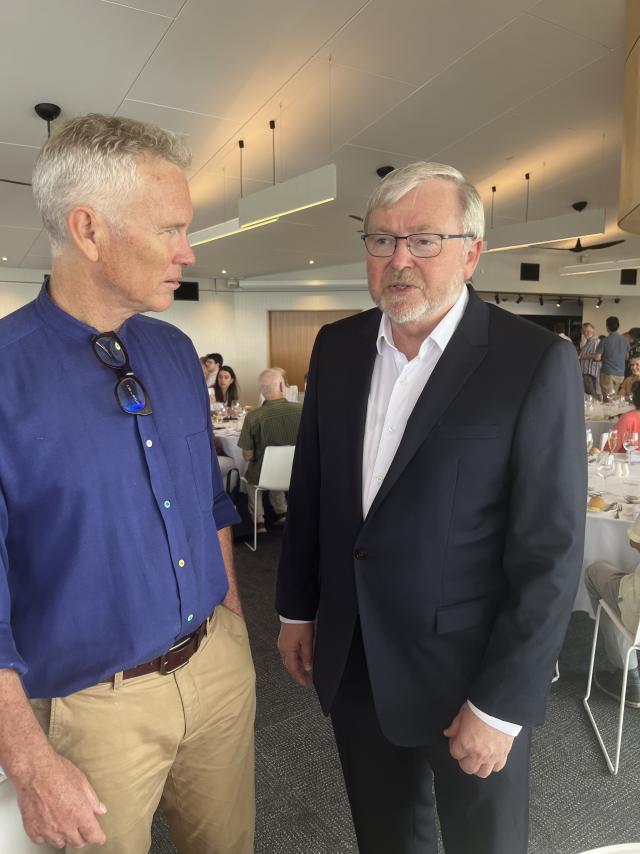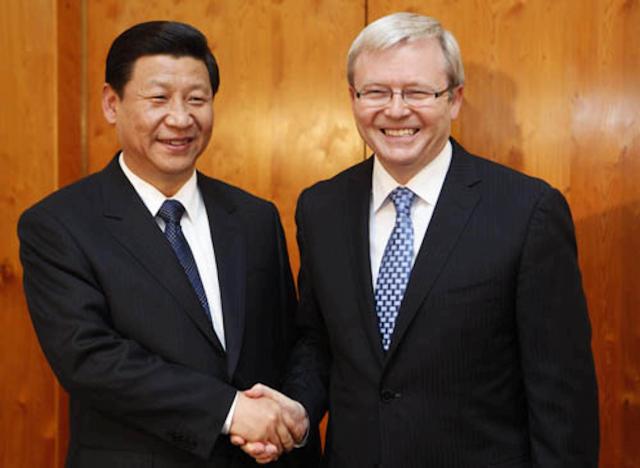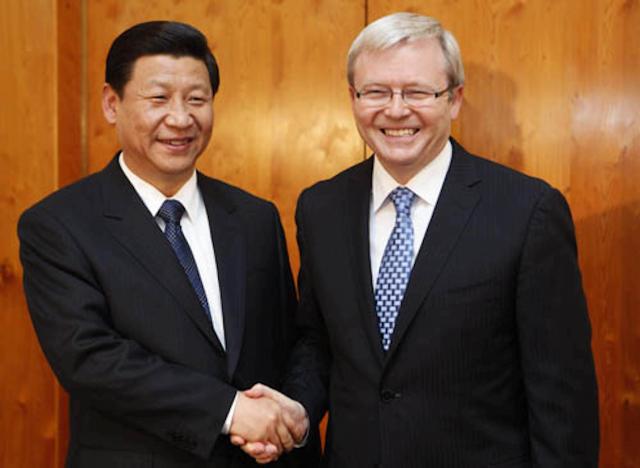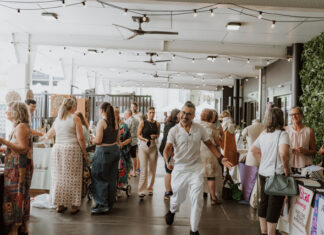The smiling, bespectacled man in the sharp black suit and open collar white business shirt, a trimmed white beard disguising slightly chubby cheeks, bears little resemblance to the frowning, faction-fighting politician of yesteryear as he hurries into the large room swelling with people who are fascinated, if not yet fans, this being conservative Noosa.
But they may well walk out as fans, because Kevin Rudd, the once-polarising 26th Prime Minister of Australia, now a cross between a revered professor and a favourite uncle, seems to have been on a charm offensive in recent years. Or perhaps the ready smile, the effusive greetings and warm handshakes are just the signs of a man, about to turn 65 and become officially old, who is at last comfortable in his skin.
The occasion is the local launch of Rudd’s latest book, The Avoidable War – The Dangers of a Catastrophic Conflict between the US and Xi Jinping’s China, a scholarly tome not necessarily in keeping with the mood of a rare sunny afternoon in May, as we take our seats at tables looking out at a sparkling Coral Sea from the function room of the Sunshine Beach Surf Club.
Rudd has arrived a little late and has to leave a little early, but he seems relaxed as he works the room en route to his seat at the head table, next to playwright David Williamson, a Noosa neighbour who shares Rudd’s politics and loathing of the Murdoch media.
No doubt they have a lot to talk about, but they don’t get the chance as David has to jump up and introduce the guest speaker.
Williamson tells an amusing story about being invited to a Kevin ’07 election night party in Noosa where, it being Noosa, only half a dozen lefties turned up.
But he and Kristin kept the faith, dancing around the television in their ’07 tee shirts as the Rudd-slide gathered force.
A couple of days before the election, this held particular interest for those fearing an Albo-slide.
He finished his introduction, however, on a more serious note.
“Kevin was one of those rare political leaders who wasn’t in the game for power’s sake. He wanted to make a difference, to rule for the many, not for the few.”
Some would debate that, but despite his sometimes-chaotic management style and his unbounded ego, Kevin Rudd as our leader was big picture Labor, a visionary who ignited our climate change response by signing the Kyoto Protocol days after taking office in 2007, said sorry to the Stolen Generations, took on China over human rights abuses and arguably saved Australia from recession during the Global Financial Crisis.
And while he may never have picked up the hose, he certainly donned the gum boots during Brisbane’s disastrous 2011 flood.
A rusted-on Labor supporter since Whitlam saved me from going to Vietnam in 1972, I initially saw Rudd as the latest in the pantheon of Labor heroes like Whitlam, Hawke and Keating.
But within the party and without, his star seemed to fade fast, and when his short second stay in the Lodge finished in 2013 I wasn’t surprised to see him leave politics. Nevertheless, if every Prime Minister left a similar legacy, we’d be a better country for it.
Although somewhat removed from the public gaze, Rudd’s second stanza has been as remarkable as the first.
Almost immediately, Kevin Rudd reinvented himself as one of the world’s leading China experts, and accepted an offer from Harvard University to study US-China relations.
His credibility and credentials in this field are impeccable, and at Harvard and many of the great political think tanks of the world, he has advanced his reputation in a field that has been a passion for the fluent Mandarin speaker since university days.
Not bad for a lad from Nambour High, and this is what brings us together in the sun-speckled surf club.
When Rudd steps up to the lectern, as a sometime book spruiker myself I can’t help but think he’s got the job ahead of him.
Having read only reviews and the publisher precis of The Avoidable War, I already know that it’s a big, dense read on a subject that a lot of people would rather not think about.
But in addition to his encyclopedic knowledge of China specifically and geopolitics generally, Kevin Rudd knows how to turn people.
So he gets up and talks about being a young boy in Eumundi. Brilliant.
“My book begins with a reference to my childhood memories from Eumundi, in those days population about 200, pre-markets. Our Uncle Eric always said when the markets were starting, ‘It’ll be the ruination of the town’.
“One of the earliest of those memories is from an Anzac Day in the early ‘60s when I’m marching up the main street, a tiny tot holding my father’s hand, Dad going ‘left, left, left right left’, and me buggering it up. Past the Imperial Hotel, which my father used to subsidise, to the memorial at the bottom of Memorial Park.
“If you look at those splendid Moreton Bay figs there, they were each planted in memory of the local men who died in the Great War. In a community of 200, 20 local boys died. There would not have been a family that wasn’t affected.
“And I remember these old guys marching with us who were World War I veterans, in their 70s by now, one of them a bit staggery, and I remember Dad saying, ‘That’s Ted, he’s still suffering from shell shock. He was a survivor of the Western Front.’
“For a kid, that leaves a memory in your head that never leaves. You think, how the hell did that happen?”
Everyone in the room is totally engaged, and the trick, if you will, is that the Great War story, writ small in his Eumundi memory, is actually the start of his book and the key to understanding the case it makes.
Having taken us back to the assassination of the Archduke Ferdinand, and the escalation from crisis to conflict to war that followed, Rudd says: “Part of the origin and the thesis of this book is that when I hear that crisis, conflict and war is now inevitable between China and the US, there’s something of the Eumundi boy in me that says, I don’t like that, what can we do to prevent that from happening?”
If the segue from Eumundi to the Austro-Hungarian Empire and back again was something of a tightrope walk, our next sidebar journey to Ancient Greece is nothing short of miraculous, not to mention seamless.
“After the 2013 Federal election, in which some of you may remember, I came second, I went to Harvard where a colleague and friend of mine had just published a brilliant book which explained Thucydide’s Trap, in which the ancient historian concluded that ‘the rise of Athens and the fear this instilled in Sparta made war inevitable’.
“This translates to the structure we have now of an established power, the US, and a rising power, China. The trap being is it now destiny that they must go to war?
“Graham Allison’s book, Destined For War, based on 16 case studies of similar situations, concludes that war is more likely than not. That book has had enormous influence in both the US and China, but in the great tradition of Queensland frankness, I said to my colleague, ‘I don’t agree with that, mate.’
“And off I went to write my response, The Avoidable War.”
Rudd goes on to give us intimate glimpses inside the mindset of Xi Jinping, based on his numerous conversations in Mandarin with the Chinese leader over the past decade or so, but he offers no flip fireside chat solutions to the growing problem.
He says: “If you were to sum up what the US-China relationship is right now, it’s one of intense, unmanaged, strategic competition across all domains, with very little space for these two countries to collaborate on anything. The ‘Eumundi School of International Relations’ offers the following alternative: rather than unmanaged, strategic competition, what about managed strategic competition?
“What I mean by that is that you can have basic rules of the road, you can have guard rails, and you can jointly choose to operate within them.
“Is it naïve to think that this could happen? I go back to the Cuban Missile Crisis of 1962.”
While my childhood memory of that week of brinkmanship between Kennedy and Khrushchev still makes me shiver, I think Rudd makes a good point.
As a result, the two superpowers did establish ground rules, and the Cold War never got so heated again. Until now, perhaps, as we enter what Rudd calls “the dangerous decade”.
I’m halfway through The Avoidable War and, although there’s an intellectual challenge on every page and a philosophical one every second page, I’m enjoying it immensely. But not quite as much as I enjoyed the lessons and laughs from K. Rudd at the surf club.
In his shout line on the book’s cover, the esteemed Henry Kissinger describes Rudd as “one of today’s most thoughtful analysts of China’s development”.
To this I would add, and easily the most entertaining.










